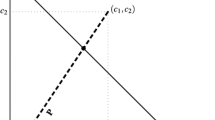Abstract
Theoretical research on claims problems has concentrated on normative properties and axiomatizations of solution concepts. We complement these analyses by empirical evidence on the predictability of three classical solution concepts in a bankruptcy problem. We examine both people’s impartial normative evaluations as well as their actual negotiation behavior in a bargaining with claims environment. We measure people’s judgments on the normative attractiveness of solution concepts with the help of a survey and also observe actual agreements in a bargaining experiment with real money at stake. We find that the proportional solution is the normatively most attractive rule, whereas actual negotiation agreements are closest to the ‘constrained equal-award’ solution.
Similar content being viewed by others
References
Albers W, Albers G (1983). On the prominence structure of the decimal system. In: Scholz RW (eds). Decision making under uncertainty. Elsevier, Amsterdam, pp. 271–287
Aumann RJ, Maschler M (1985) Game theoretic analysis of a bankruptcy problem from the Talmud. J Econ Theory 36:195–213
Babcock L, Camerer C, Issacharoff S, Camerer CF (1995) Biased judgments of fairness in bargaining. Am Econ Rev 85:1337–1343
Ball S, Eckel C, Grossman PJ, Zame W (2001) Status in markets. Q J Econ 116:161–188
Beckman SR, Formby JP, Smith JW, Zheng B (2002) Envy, malice and Pareto efficiency: an experimental examination. Soc Choice Welfare 19:349–367
Brandel F (2000) Rabbit: version 1.0. Mimeo. Institute for Advanced Studies, Vienna
Chun Y, Thomson W (1992) Bargaining problems with claims. Math Soc Sci 24:19–33
Chun Y, Schummer J and Thomson W (2001) Constrained egalitarianism: a new solution to bankruptcy problems. Seoul J Econ 14:269–297
Clark J (1998) Fairness in public good provision: an investigation of preferences for equality and proportionality. Can J Econ 31:708–729
Curiel I, Maschler M, Tijs SH (1987) Bankruptcy games. Z Oper Res 31:A143–A159
Dagan N (1996) New characterizations of old bankruptcy rules. Soc Choice Welfare 13:51–59
Dagan N, Volij O (1993) The bankruptcy problem: a cooperative bargaining approach. Math Soc Sci 26:287–297
Dagan N, Serrano R, Volij O (1997) A non-cooperative view of consistent bankruptcy rules. Games Econ Behav 26:55–72
Feldman B (1999) The proportional value of a cooperative game. Mimeo
Frohlich N, Oppenheimer JA (1990) Choosing justice in experimental democracies with production. Am Poli Sci Rev 84(2):461–477
Frohlich N, Oppenheimer JA, Eavey CL (1987) Choices of principles of distributive justice in experimental groups. Am J Polit Sci 31(3):606–637
Gächter S, Riedl A (2005) Moral property rights in bargaining with infeasible claims. Manage Sci 51(2):249–263
Gaertner W, Jungeilges J (2002) Evaluation via extended orderings: empirical findings from Western and Eastern Europe. Soc Choice Welfare 19:29–55
Gaertner W, Klemisch–Ahlert M (1992) Social choice and bargaining perspectives on distributive justice. Springer, Berlin Heidelberg New York
Gaertner W, Jungeilges J, Neck R (2001) Cross-cultural equity evaluations: A questionnaire-experimental approach. Eur Econ Rev 45:953–963
Herrero C, Villar A (2001) The three musketeers: four classical solutions to bankruptcy problems. Math Soc Sci 42:307–328
Herrero C, Moreno–Ternero JD, Ponti G (2004) On the adjudication of conflicting claims: an experimental study. Working paper, University of Alicante
Hoffman E, McCabe K, Shachat K, Smith V (1994) Preferences, property rights, and anonymity in bargaining games. Games Econ Beha 7:346–380
Kahneman D, Knetsch J, Thaler R (1986) Fairness as a constraint on profit seeking: Entitlements in the market. Am Econ Rev 76(4):728–741
Klemisch–Ahlert M (1996) Bargaining in economic and ethical environments. An experimental study and normative solution concepts. Springer, Berlin Heidelberg New York
Konow J (2000) Fair shares: accountability and cognitive dissonance in allocation decisions. Am Econ Rev 90:1072–1091
Konow J (2002) Which is the fairest one of all? A positive analysis of justice theories. J Econ Lit XLI:1188–1239
Kuon B, Uhlich GR (1993) The negotiation agreement area: an experimental analysis of two-person characteristic function games. Group Decis Negotiat 2:323–345
Loewenstein G (2000) Emotions in economic theory and economic behavior. Am Econ Rev Pap Proc 90:426–432
Moulin H (1987) Equal or proportional division of a surplus, and other methods. Inter J Game Theory 16:161–186
Moulin H (2000) Priority rules and other asymmetric rationing methods. Econometrica 68:643–684
Nydegger RV, Owen G (1975) Two-person bargaining: an experimental test of the Nash axioms. Inter J Game Theory 3:239–249
O’Neill B (1982) A problem of rights arbitration from the talmud. Math Soc Sci 2:345–371
Roth AE, Murnighan KJ (1982) The role of information in bargaining: an experimental study. Econometrica 50:1123–1142
Roth AE, Murnighan KJ, Schoumaker F (1988) The deadline effect in bargaining: some experimental evidence. Am Eco Rev 78:155–162
Schokkaert E, Capeau B (1991) Interindividual differences in opinions about distributive justice. Kyklos 44(3):325–345
Schokkaert E, Overlaet B (1989) Moral intuitions and economic models of distributive justice. Soc Choice Welfare 6:19–31
Selten R (1978). The equity principle in economic behavior. In: Gottinger HW, Leinfellner W (eds). Decision theory and social effects. Kluwer, Dordrecht, pp. 289–301
Selten R (1987). Equity and coalition bargaining in experimental three-person games. In: Roth AE (eds). Laboratory experimentation in economics: six points of view. Cambridge University Press, Cambridge, pp. 42–98
Selten R (1991) Properties of a measure of predictive success. Math Soc Sci 21:153–167
Selten R, Krischker S (1983). Comparison of two theories for characteristic function experiments. In: Tietz R (eds). Aspiration levels in bargaining and economics decision making. Springer, Heidelberg New York, pp. 259–264
Thomson W (2003) Axiomatic and game-theoretic analyses of bankruptcy and taxation problems: a survey. Math Soc Sci 45:249–297
Uhlich GR (1990) Descriptive theories of bargaining: an experimental analysis of two- and three-person characteristic function bargaining. Lecture Notes in Economics and Mathematical Systems, No. 341. Springer, Berlin Heidelberg New York
Yaari ME, Bar-Hillel M (1984) On dividing justly. Soc Choice Welfare 1:1–24
Young HP (1988) Distributive justice in taxation. J Econ Theory 43:321–335
Author information
Authors and Affiliations
Corresponding author
Rights and permissions
About this article
Cite this article
Gächter, S., Riedl, A. Dividing Justly in Bargaining Problems with Claims. Soc Choice Welfare 27, 571–594 (2006). https://doi.org/10.1007/s00355-006-0141-z
Received:
Accepted:
Published:
Issue Date:
DOI: https://doi.org/10.1007/s00355-006-0141-z




